外研版九年级上Module 8 Sports life Unit3 Language in use课件(共19张PPT)
文档属性
| 名称 | 外研版九年级上Module 8 Sports life Unit3 Language in use课件(共19张PPT) | 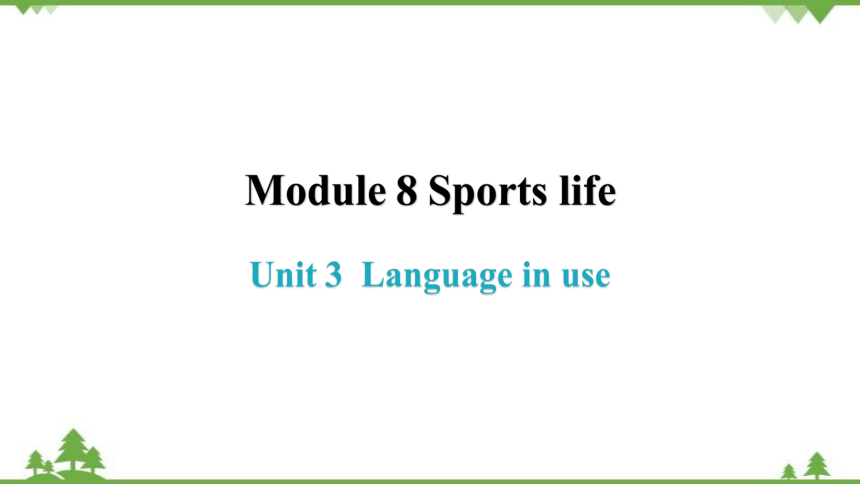 | |
| 格式 | pptx | ||
| 文件大小 | 100.5KB | ||
| 资源类型 | 教案 | ||
| 版本资源 | 外研版 | ||
| 科目 | 英语 | ||
| 更新时间 | 2022-06-23 11:30:03 | ||
图片预览

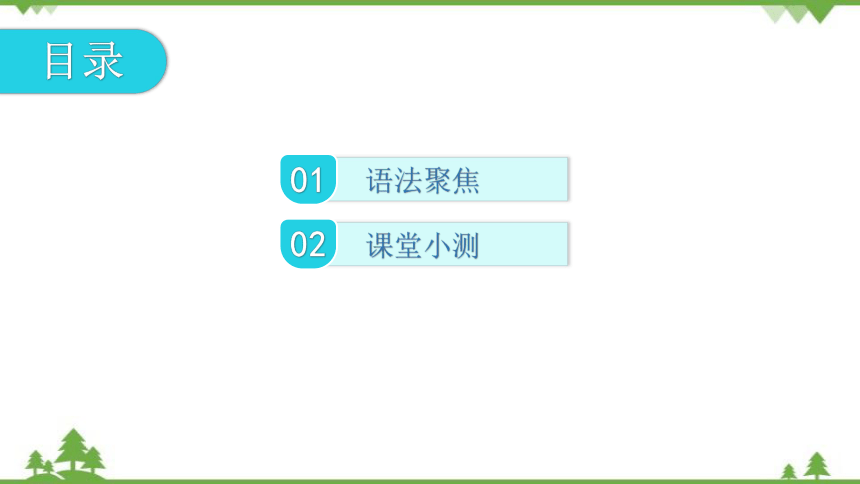
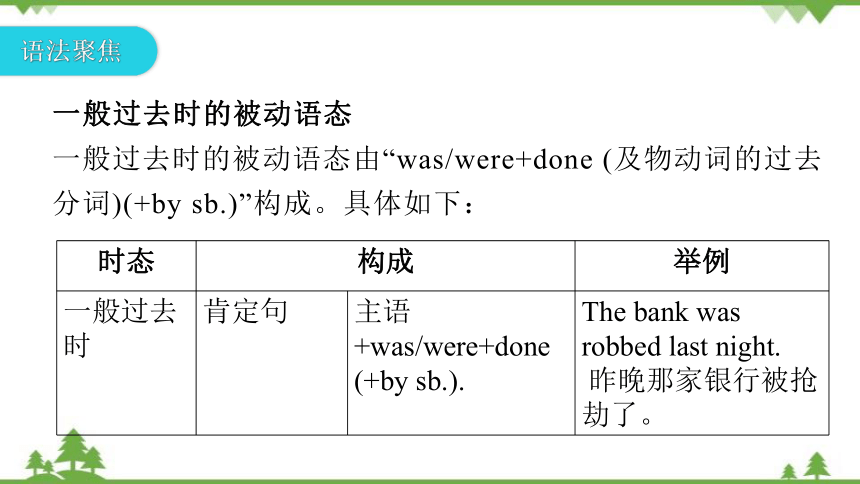

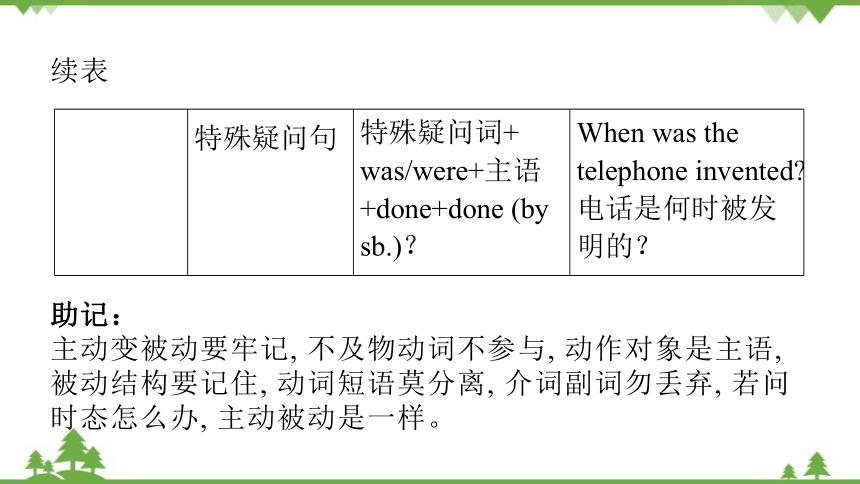
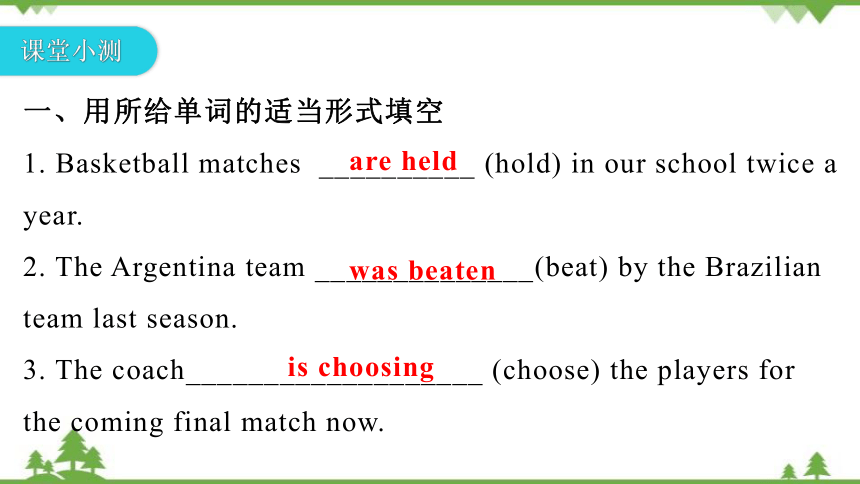
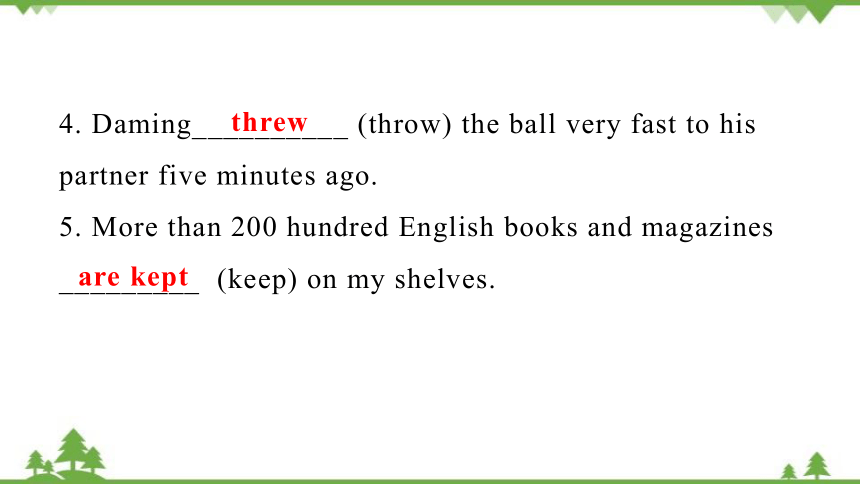
文档简介
(共19张PPT)
Unit 3 Language in use
Module 8 Sports life
目录
语法聚焦
01
课堂小测
02
语法聚焦
一般过去时的被动语态
一般过去时的被动语态由“was/were+done (及物动词的过去分词)(+by sb.)”构成。具体如下:
时态 构成 举例
一般过去时 肯定句 主语+was/were+done (+by sb.). The bank was robbed last night.
昨晚那家银行被抢劫了。
续表
否定句 主语+was/were+not+done done (+by sb.). The work wasn’t done by them.那项工作不是他们做的。
一般疑问句 Was/Were+主语+done+done (+by sb.)? Was the cup broken by Tom 杯子是被汤姆打碎的吗?
续表
助记:
主动变被动要牢记, 不及物动词不参与, 动作对象是主语, 被动结构要记住, 动词短语莫分离, 介词副词勿丢弃, 若问时态怎么办, 主动被动是一样。
特殊疑问句 特殊疑问词+ was/were+主语+done+done (by sb.)? When was the telephone invented 电话是何时被发明的?
课堂小测
一、用所给单词的适当形式填空
1. Basketball matches __________ (hold) in our school twice a year.
2. The Argentina team ______________(beat) by the Brazilian team last season.
3. The coach___________________ (choose) the players for the coming final match now.
are held
was beaten
is choosing
4. Daming__________ (throw) the ball very fast to his partner five minutes ago.
5. More than 200 hundred English books and magazines _________ (keep) on my shelves.
threw
are kept
二、找出下列句子的错误, 并在横线上进行更正
6. Nothing can stop me to get my work done on time.
________________________________________________
7. The athlete’s records was comparing with others’ so that he could learn even faster.
________________________________________________
8. He has suffered serious headaches since his parents died.
_______________________________________________
to get改为(from) getting
was comparing改为were compared
在suffered后加from
9. Before you leave the lab, remember turning off the computer and shutting the door.
________________________________________________
10. People will find it much easier to go downtown if a new bus station sets up here.
_______________________________________________
turning, shutting 改为to turn, shut
sets up改为is set up
三、单项填空(语法专练)
( )11. The letter __ in Japanese. Can you read it for me
A. writes B. wrote C. is writing D. is written
( )12. -This kind of rice tastes nice.
-Yes. It __ in Southeast China.
A. was grown B. has grown
C. is grown D. is growing
D
C
( )13. -Did you win the basketball game
-Bad luck. Our team ___ in the final one.
A. won B. beat
C. was won D. was beaten
( )14. This painting ___ to a museum in New York in 1977.
A. sells B. sold C. was sold D. is sold
D
C
( )15. A new robot ____ by a middle school student last term.
A. is invited
B. was invited
C. is inventing
D. was invented
D
四、语法选择(核心素养:思维品质)
Sports can help you keep fit and close to nature. However, 16 you are on the mountains, in the waves, or on the grassland, you 17 realise that sports you choose might have great influence on the environment.
Some sports are resource-hungry. Golf, as you may know, eats up not only large areas of countryside, but also
lots of water. Besides, huge amounts of energy 18 to keep its courses (球场) in good condition. This causes major environmental changes. For example, in the dry places of Portugal and Spain, golf is often responsible for (为……承担责任) serious water shortage in some local areas.
There are many environment-friendly sports. Power walking is one of 19 that you could take up today. You
don’t need any special equipment 20 a good pair of shoes, and you don’t have to worry about resources (装备) and your purse. Simple and free, power walking can also help you stay21. If you walk regularly, it will be good for your heart. Experts say 22 20 minutes of power walking daily can make you feel less anxious, sleep well and keep fit.
Whatever sport you take up, you can make it green by
23 environment-friendly equipment (装备) and buying products made from recycled materials. But the final goal should be “green gyms”. They are better replacements(替代) for traditional health clubs and modern sports centres. Members of green gyms play sports outdoors, in 24 countryside or other open spaces. There is 25 special requirement for you to start your membership(会员身份). And best of all, it’s free.
( )16. A. if B. after C. whether D. before
( )17. A. might B. would C. shall D. should
( )18. A. is used B. are used C. is using D. used
( )19. A. them B. themselves C. they D. theirs
( )20. A. beside B. besides C. except D. near
( )21. A. health B. healthy
C. healthily D. unhealthy
C
D
A
A
C
B
( )22. A. what B. when C. that D. because
( )23. A. use B. using C. uses D. used
( )24. A. the B. / C. a D. an
( )25. A. not B. no a C. not some D. no
C
B
A
D
课后作业
Unit 3 Language in use
Module 8 Sports life
目录
语法聚焦
01
课堂小测
02
语法聚焦
一般过去时的被动语态
一般过去时的被动语态由“was/were+done (及物动词的过去分词)(+by sb.)”构成。具体如下:
时态 构成 举例
一般过去时 肯定句 主语+was/were+done (+by sb.). The bank was robbed last night.
昨晚那家银行被抢劫了。
续表
否定句 主语+was/were+not+done done (+by sb.). The work wasn’t done by them.那项工作不是他们做的。
一般疑问句 Was/Were+主语+done+done (+by sb.)? Was the cup broken by Tom 杯子是被汤姆打碎的吗?
续表
助记:
主动变被动要牢记, 不及物动词不参与, 动作对象是主语, 被动结构要记住, 动词短语莫分离, 介词副词勿丢弃, 若问时态怎么办, 主动被动是一样。
特殊疑问句 特殊疑问词+ was/were+主语+done+done (by sb.)? When was the telephone invented 电话是何时被发明的?
课堂小测
一、用所给单词的适当形式填空
1. Basketball matches __________ (hold) in our school twice a year.
2. The Argentina team ______________(beat) by the Brazilian team last season.
3. The coach___________________ (choose) the players for the coming final match now.
are held
was beaten
is choosing
4. Daming__________ (throw) the ball very fast to his partner five minutes ago.
5. More than 200 hundred English books and magazines _________ (keep) on my shelves.
threw
are kept
二、找出下列句子的错误, 并在横线上进行更正
6. Nothing can stop me to get my work done on time.
________________________________________________
7. The athlete’s records was comparing with others’ so that he could learn even faster.
________________________________________________
8. He has suffered serious headaches since his parents died.
_______________________________________________
to get改为(from) getting
was comparing改为were compared
在suffered后加from
9. Before you leave the lab, remember turning off the computer and shutting the door.
________________________________________________
10. People will find it much easier to go downtown if a new bus station sets up here.
_______________________________________________
turning, shutting 改为to turn, shut
sets up改为is set up
三、单项填空(语法专练)
( )11. The letter __ in Japanese. Can you read it for me
A. writes B. wrote C. is writing D. is written
( )12. -This kind of rice tastes nice.
-Yes. It __ in Southeast China.
A. was grown B. has grown
C. is grown D. is growing
D
C
( )13. -Did you win the basketball game
-Bad luck. Our team ___ in the final one.
A. won B. beat
C. was won D. was beaten
( )14. This painting ___ to a museum in New York in 1977.
A. sells B. sold C. was sold D. is sold
D
C
( )15. A new robot ____ by a middle school student last term.
A. is invited
B. was invited
C. is inventing
D. was invented
D
四、语法选择(核心素养:思维品质)
Sports can help you keep fit and close to nature. However, 16 you are on the mountains, in the waves, or on the grassland, you 17 realise that sports you choose might have great influence on the environment.
Some sports are resource-hungry. Golf, as you may know, eats up not only large areas of countryside, but also
lots of water. Besides, huge amounts of energy 18 to keep its courses (球场) in good condition. This causes major environmental changes. For example, in the dry places of Portugal and Spain, golf is often responsible for (为……承担责任) serious water shortage in some local areas.
There are many environment-friendly sports. Power walking is one of 19 that you could take up today. You
don’t need any special equipment 20 a good pair of shoes, and you don’t have to worry about resources (装备) and your purse. Simple and free, power walking can also help you stay21. If you walk regularly, it will be good for your heart. Experts say 22 20 minutes of power walking daily can make you feel less anxious, sleep well and keep fit.
Whatever sport you take up, you can make it green by
23 environment-friendly equipment (装备) and buying products made from recycled materials. But the final goal should be “green gyms”. They are better replacements(替代) for traditional health clubs and modern sports centres. Members of green gyms play sports outdoors, in 24 countryside or other open spaces. There is 25 special requirement for you to start your membership(会员身份). And best of all, it’s free.
( )16. A. if B. after C. whether D. before
( )17. A. might B. would C. shall D. should
( )18. A. is used B. are used C. is using D. used
( )19. A. them B. themselves C. they D. theirs
( )20. A. beside B. besides C. except D. near
( )21. A. health B. healthy
C. healthily D. unhealthy
C
D
A
A
C
B
( )22. A. what B. when C. that D. because
( )23. A. use B. using C. uses D. used
( )24. A. the B. / C. a D. an
( )25. A. not B. no a C. not some D. no
C
B
A
D
课后作业
同课章节目录
- Module 1 Wonders of the world
- Unit 1 It's more than 2,000 years old.
- Unit 2 The Grand Canyon was not just big.
- Unit 3 Language in use
- Module 2 Public holidays
- Unit 1 My family always go somewhere interesting a
- Unit 2 We have celebrated the festival since the f
- Unit 3 Language in use
- Module 3 Heroes
- Unit 1 She trained hard,so she became a great play
- Unit 2There were few doctors, so he had to work ve
- Unit 3 Language in use
- Module 4 Home alone
- Unit 1 I can look after myself, although it won’t
- Unit 2 I became so bored with their orders that I
- Unit 3 Language in use
- Module 5 Museums
- Unit 1 Don't cross that rope!
- Unit 2 If you ever go to London, make sure you vis
- Unit 3 Language in use
- Module 6 Problems
- Unit 1 If I start after dinner, I'll finish it be
- Unit 2 If you tell him the truth now, you will sho
- Unit 3 Language in use
- Revision Module A
- Module 7 Great books
- Unit 1 We're still influenced by Confucius's idea
- Unit 2 It is still read and loved.
- Unit 3 Language in use
- Module 8 Sports life
- Unit 1 Daming wasn't chosen for the team last time
- Unit 2 He was invited to competitions around the w
- Unit 3 Language in use
- Module 9 Great inventions
- Unit 1 Will computers be used more than books in t
- Unit 2 Will books be replaced by the Internet?
- Unit 3 Language in use
- Module 10 Australia
- Unit 1 I have some photos that I took in Australia
- Unit 2 The game that they like most is Australian
- Unit 3 Language in use
- Module 11 Photos
- Unit 1 He's the boy who won the photo competition
- Unit 2 The photo which we liked best was taken by
- Unit 3 Language in use
- Module 12 Save our world
- Unit 1 If everyone starts to do something, the wor
- Unit 2 Repeat these three words daily: reduce, reu
- Unit 3 Language in use
- Revision Module B
